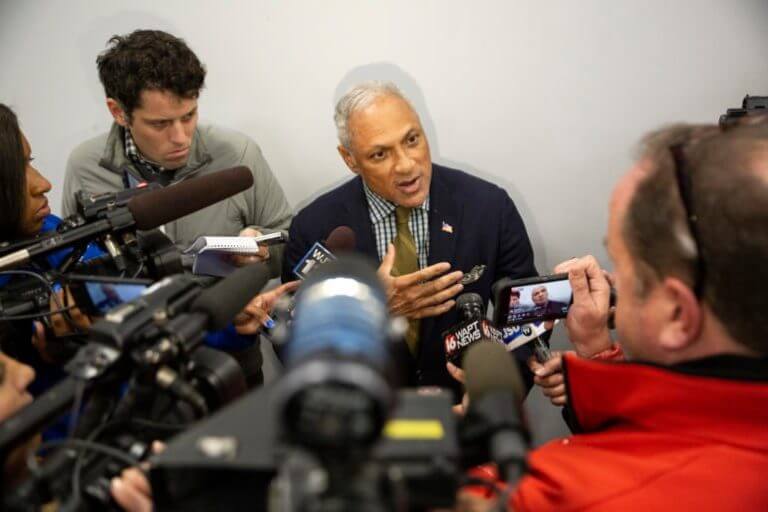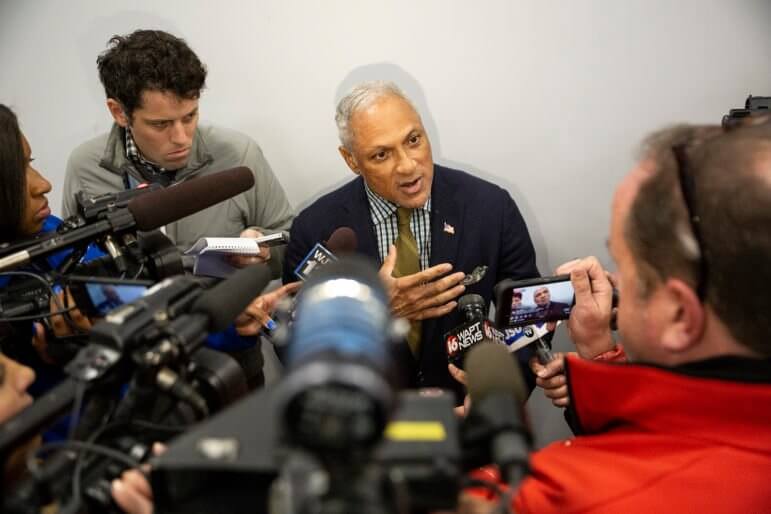

Eric J. Shelton, Mississippi Today / Report for America
Mike Espy speaks to reporters at New Horizon Church in Jackson on Nov. 14, 2018.
WASHINGTON — Democratic Senate candidate Mike Espy is officially coming out in favor of the state’s medical marijuana legalization initiative, telling Mississippi Today that he believes sick patients should be entitled to what amounts to medicine.
“I support Initiative 65 because it provides a well-regulated treatment option to those that need it,” Espy said in an emailed statement. “Medical marijuana can provide relief for many Mississippians who suffer from nausea during chemotherapy, arthritis, the effects of autoimmune illnesses, post-traumatic stress disorder, chronic pain, anxiety, and many other conditions.”
The comment marks Espy’s first confirmation to a news organization about the reasons he is in favor of Initiative 65 since its supporters gathered enough signatures and submitted it September 2019 to be on the ballot this November. Espy is using a four-to-one cash advantage to try to unseat Republican Sen. Cindy Hyde-Smith and become the first Democratic senator since 1989.
Hyde-Smith’s campaign did not reply to a request seeking comment on her stance on medical marijuana. Hyde-Smith, though, told WJTV on Oct. 16 that she opposes Initiative 65 and that regulation of marijuana should be left up to the federal government.
“We need, first of all, something that the (Mississippi) Legislature can control,” she said. “And if cities and municipalities don’t want that in their communities, they need to have some local control over that, as well. So I do oppose what is on the ballot right now.”
Espy’s support of the program could provide a small boost to his campaign, which likely needs to attract any and all voting blocs to win in November. A recent poll had him within the margin of error in the rematch against Hyde-Smith. But gauging just how much support he could gain from moving on a single issue is difficult this year because of national trends — and especially in Mississippi, where several other initiatives are on the ballot this election.
Nationwide, there is some thought and research backing up the idea that Democratic candidates can increase youth turnout by using marijuana as a wedge issue, but the data is far from definitive. Medical marijuana, in particular, has enjoyed increasingly bipartisan support nationwide. And in Mississippi, some libertarian and right-leaning groups have backed Initiative 65 since its inception, so there’s no guarantee any turnout bump would bring only Democrats to the polls.
Mississippi voters are also being asked to approve a new state flag design, which would for the first time in more than 126 years not include the Confederate emblem. Another ballot initiative would do away with a state-level electoral college. And there is the small matter of who will be president, too.
National issues like the presidential election and the COVID-19 pandemic, along with local issues like the medical marijuana initiative, the flag and the effort to repeal what critics have called a Jim Crow-era statewide election rule are all working in unison to motivate young people to turn out, said Kendall Witmer, the Espy campaign’s communications director.
READ MORE: Medical marijuana will be on the November ballot, but it’ll be confusing.
Jarrius Adams, president of the Young Democrats of Mississippi, said he has been pushing Initiative 65, but a lot of people he meets don’t even know one measure is on the ballot, let alone two. He said he has also been pitching Initiative 65 as just the first step, telling voters that if they want to see marijuana legalized outright in the next few years, they have to start here. But it has been a hard sell, he conceded.
“There hasn’t been as much buzz,” he said. “I’m sure if it was legalizing marijuana that would be a whole different story, but yes, for sure, medical marijuana has been a challenge to get folks out for that sole reason.”
In 2012, Colorado and Washington saw massive youth voter increases when they had legalization initiatives on the ballot. But candidates this year looking to rev up Democrats need say little more than “President Donald Trump,” according to marijuana experts.
“One would think that, on the Democratic side, there would be more enthusiasm, and there probably is. However, this particular election, we are seeing huge amounts of Democratic enthusiasm, which is probably, you know, hatred of Trump,” said Nathaniel Gurien, a cannabis expert who works in the marijuana banking sector. “So, the question is, is cannabis going to increase the number of people who show up who are Democratic? I would be inclined to think no because they are going to show up anyway.”
But in Mississippi, pro- and anti-Initiative 65 advertising blitzes have ramped up in the state. And what limited polling does exist around the issue shows it is vastly popular, with a poll from California-based FM3 research showing in the summer that more than 80% of Mississippi voters support medical marijuana in principle.
READ MORE: Mississippi medical marijuana rhetoric intensifies as November vote approaches.
Although the “Yes on Initiative 65” tag has been part of the Mississippi Democratic Party platform this year, and, according to Espy’s campaign, has appeared on some of his door hangers and other campaign literature since last month, the former congressman had not publicly outlined his rationale for supporting the measure.
The comment shared with Mississippi Today this week shows an evolution in Espy’s public stance on the issue over the last two years. In September 2018, just a month ahead of a special election for the Senate seat he lost to Hyde-Smith, the former U.S. secretary of agriculture said he was open to looking at medical marijuana as something like a cold hard cash crop.
“We need more revenue in Mississippi. So just like legalized betting, I’d be open to reviewing the facts and the economic estimates of what that would bring to the state’s coffers,” Espy told the Jackson Free Press at the time.
But he also expressed some concern about safety for people who do use marijuana, echoing a common argument opponents of the issue have deployed.
“There are a lot of studies out there about how if you are under the influence it still impairs your ability,” he said. “I would just have to know if it was safe and if it was a financial benefit to the state.”
That hesitation no longer seemed to exist in his public stance shared this week. Espy appears now to view medical marijuana as first and foremost a healthcare issue. And his spokeswoman noted that although few in the press have asked where he stands on the issue, he has been having one-on-one talks with constituents about his support for Initiative 65 all cycle.
“If you have an illness or a disorder in Mississippi, I firmly believe you should be able to get the same safe treatment, under a doctor’s orders, in Mississippi, that you can get in many other states,” Espy said in the statement.
Espy’s stance in favor of the initiative makes him one of the few Senate candidates in a close race in a state where a marijuana-related ballot measure is up for a vote this year to firmly back the measure.
Two other close races that will decide the future of the Senate are happening in states where marijuana is up for a vote. Granted, Arizona and Montana are voting on whether to legalize adult-use marijuana after having already had functional medical marijuana programs. But in both cases, the Democratic Senate candidates have been either silent or tepid in their endorsements.
In Mississippi, other Democrats have remained mum on the issue. Rep. Bennie Thompson, who is the state’s only Democrat in Washington, said in September that he would just as soon stay away from the issue, adding, “I’m leaving it up to the public.”
As an exception, Antonia Eliason, a University of Mississippi School of Law professor who is running against GOP Rep. Trent Kelly in the state’s first congressional district, has framed it as a criminal justice issue. She told Mississippi Today, unprompted, in a candidate questionnaire that she wants to “legalize cannabis and release those incarcerated on cannabis-related charges.”
Some trepidation on the part of politicians could be chalked up to the fact that there are diminishing returns for supporting what is, in Mississippi’s case, an initiative legalizing medical marijuana for people with serious conditions, not legal access for adults. John Hudak, an expert on marijuana at the nonpartisan Brookings Institution, said when he has observed increased excitement on the ground among young people, it has been for legalizing marijuana outright.
“That is not the case necessarily for medical initiatives,” Hudak said. “Medical cannabis—given that it has such ubiquitous support and is not something that drives liberals in a disproportionate way relative to conservatives—is unlikely to see similar youth effects.”
That may explain Mississippi medical marijuana proponents’ strategy to play both sides. Just this week, the Trump campaign Director Michael J. Glassner sent a cease and desist letter to Jamie Grantham, spokeswoman for Mississippians for Compassionate Care, objecting to fliers asking voters to “‘JOIN PRESIDENT TRUMP’ in supporting legalization of medical marijuana in Mississippi.”
Adding to some of the malaise around the issue, legalizing medical marijuana has been obfuscated by the presence of two competing ballot initiatives up for a vote: Initiative 65, added by virtue of voters signing a ballot petition, and a more restrictive measure, 65A, that was added by the Legislature. The second measure would limit smoking of medical marijuana to terminally ill patients and give the state Legislature more control over how to implement a medical program.
Daniel Newhauser is a freelance journalist based in Washington, D.C. His work has appeared in The Atlantic, The Daily Beast, National Journal, Politico, Roll Call, VICE News and several other publications. He can be found on Twitter @dnewhauser.
The post Espy endorses medical marijuana initiative. Could it be a boon to his campaign? appeared first on Mississippi Today.
- Mississippi Explained News Quiz: School choice and prison health care reform appear dead - March 2, 2026
- Two plead guilty to collecting pandemic-related unemployment benefits while in prison - March 2, 2026
- Michael Watson confirms he won’t seek third secretary of state term, hints at higher office - March 2, 2026